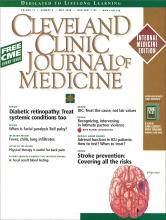Index by author
Ahmed, Anwar
- You have accessWhen is facial paralysis Bell palsy? Current diagnosis and treatmentAnwar Ahmed, MDCleveland Clinic Journal of Medicine May 2005, 72 (5) 398-405;
Bell palsy is largely a diagnosis of exclusion, but certain features distinguish it from facial paralysis due to other conditions.
Choure, Arti J.
- You have accessFever, chills, and chest radiographic infiltrates in a middle-aged womanArti J. Choure, MD, Rabin K. Shrestha, MD, Steven P. Larosa, MD and Atul C. Mehta, MBBSCleveland Clinic Journal of Medicine May 2005, 72 (5) 367-374;
A woman with a history of asthma, hypothyroidism, nephrolithiasis, and bowel problems has worsening shortness of breath. She also has an interesting hobby.
Delvecchio, Cherie
- You have accessDiabetic retinopathy: Treating systemic conditions aggressively can save sightStephen H. Sinclair, MD, Richard Malamut, MD, Cherie Delvecchio, OD and Weiye Li, MD, PhDCleveland Clinic Journal of Medicine May 2005, 72 (5) 447-454;
To control diabetic retinopathy, we need not only to detect it promptly, but also to manage common systemic comorbid conditions such as hypertension, hyperlipidemia, anemia, obstructive sleep apnea, and smoking—all of which tend to accelerate its course and increase its severity.
Gupta, Rishi
- You have accessPreventing ischemic stroke: Choosing the best strategyRishi Gupta, MD and Derk W. Krieger, MD, PhDCleveland Clinic Journal of Medicine May 2005, 72 (5) 433-444;
Do statins prevent stroke? Which antithrombotic drugs are best? What is the best way to treat carotid stenosis?
Hamrahian, Amir
- You have accessAdrenal function in critically ill patients: How to test? When to treat?Amir Hamrahian, MDCleveland Clinic Journal of Medicine May 2005, 72 (5) 427-432;
There is evidence that even partial adrenal insufficiency is associated with increased mortality. But exactly how should adrenal insufficiency be defined and diagnosed, and who should receive treatment?
Herbert, Linda
- You have accessRecognizing and intervening in intimate partner violenceGurjit Kaur, DO and Linda Herbert, LISWCleveland Clinic Journal of Medicine May 2005, 72 (5) 406-422;
Intimate partner violence is as at least common as many conditions for which we routinely screen. Yet it remains underdiagnosed and undertreated.
Kaur, Gurjit
- You have accessRecognizing and intervening in intimate partner violenceGurjit Kaur, DO and Linda Herbert, LISWCleveland Clinic Journal of Medicine May 2005, 72 (5) 406-422;
Intimate partner violence is as at least common as many conditions for which we routinely screen. Yet it remains underdiagnosed and undertreated.
Kitchens, Craig S.
- You have accessDisseminated intravascular coagulation: Treat the cause, not the lab valuesCarrie Ann Labelle, MD and Craig S. Kitchens, MDCleveland Clinic Journal of Medicine May 2005, 72 (5) 377-397;
Therapy directed at laboratory manifestations of DIC often will not change the course of the illness. It is important to recognize and treat the underlying cause, eg, trauma, cancer, infection, or obstetric catastrophe.
Krieger, Derk W.
- You have accessPreventing ischemic stroke: Choosing the best strategyRishi Gupta, MD and Derk W. Krieger, MD, PhDCleveland Clinic Journal of Medicine May 2005, 72 (5) 433-444;
Do statins prevent stroke? Which antithrombotic drugs are best? What is the best way to treat carotid stenosis?
Labelle, Carrie Ann
- You have accessDisseminated intravascular coagulation: Treat the cause, not the lab valuesCarrie Ann Labelle, MD and Craig S. Kitchens, MDCleveland Clinic Journal of Medicine May 2005, 72 (5) 377-397;
Therapy directed at laboratory manifestations of DIC often will not change the course of the illness. It is important to recognize and treat the underlying cause, eg, trauma, cancer, infection, or obstetric catastrophe.




